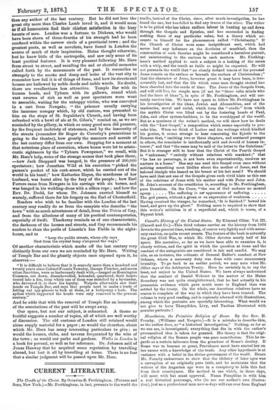CURRENT LITERATURE.
The Cradle of the Christ. By Octavins B. Frothingham. (Putnam and Sons, New York.)—Mr. Frothingham, in fact, presents to the world the cradle, instead of the Christ, since, after much investigation, be has found the one, but has failed to find any traces of tbe other. The writer is to be pitied who has taken endless labour in hunting up and down through the Gospels and Epistles, and has succeeded in finding nothing there of any particular value, but a theory which ac- counts to himself for the phenomenon called " Christianity." If the Church of Christ were some insignificant sect, which had never had any influence on the destinies of mankind, then the construction of such theories might be considered a harmless pursuit, not uninteresting to the curious in such matters. Mr. Frothing- ham's method applied to such a subject is a lashing of the ocean with a whip, and the result as futile as might be expected. He will not persuade the world that" no clearly defined traces of the personal Jesus remain on the surface or beneath the surface of Christendom ;" that the character of Jesus, however groat it may have been, is irre- coverably lost, and that the life which some men thought eternal has been absorbed into the sands of time. The Jesus of the Gospels lives, and will still live, for simple men (if not for "those calm minds who feel the force of ideas"), in spite of Mr. Frothingham, and will cer- tainly survive him. We have not space to follow Mr. Frothingham in his investigation of the ideas, Jewish and Alexandrian, and of the tendencies, moral and social, which form the "cradle" from which the mythic Christ was lifted out by the fostering hands of Paul, John, and other system-builders, to be the worshipped of the world. But as a specimen of the writer's method, we will show how ho deals with the "Last Gospel," a composition which seems especially to pro- voke him. When we think of Luther and the writings which kindled his genius, it seems strange to hear concerning the Epistle to the Romans that, "omitting two or three chapters, and scattered passages in others, the remainder is intellectually arid and devoid of human in; terest ;" and that "the same may be said of the letter to the Galatians.' But it is stranger still to hear that the Christ of the Fourth Gospel is " unhuman," "entirely without relations with mankind ;" that "he has no parentage, is not born even supernaturally, receives no nurture in a home." Has any one read this Gospel oven once without noticing something most lifelike about the mother of Jesus, and the beloved disciple who leaned on his breast at his last meal ? We should have said that not one of the Gospels gives such vivid hints as this one of the relations of Jesus with his mother and with Peter and John. St. John's account of the crucifixion is, according to Mr. Frothingham, pure Doxatism. On the Cross, "the son of God endures no mental
agony The suffering is an' appearance of suffering The god passes, without a groan or an expression of weakness Having received the vinegar, he remarked, It is finished I' bowed his head, and gave up the ghost." Nothing more is required to show that this writer's criticism is of a superficial and, which is worse, of a flippant kind.


































 Previous page
Previous page